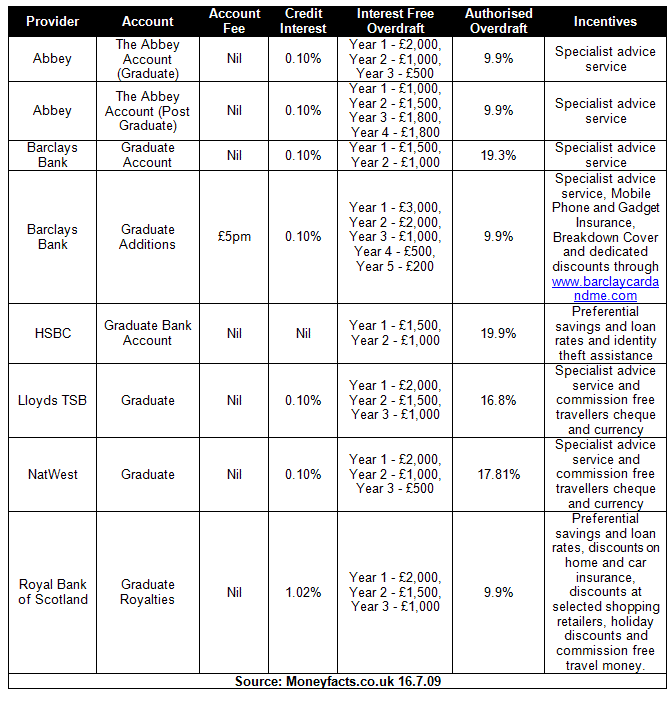Graduate Finance, Bank Accounts Overdraft and Fees Analysis
Personal_Finance / UK Banking Jul 16, 2009 - 08:53 AM GMTBy: MoneyFacts
 As another academic year draws to a close, many graduates are leaving university to enter very challenging times. The recession is having a detrimental effect on the number of jobs available, so it is important that students take their finances seriously.
As another academic year draws to a close, many graduates are leaving university to enter very challenging times. The recession is having a detrimental effect on the number of jobs available, so it is important that students take their finances seriously.
Louis Kaszczak, Head of Moneyfacts.co.uk, comments:
“After years of studying, it is unlikely that sorting out their finances is the first thing on graduates’ minds, but with many leaving university owing a five figure sum, finding the best graduate account for their circumstances could help save them money.
“Many graduates will inevitably remain loyal to their student account provider, but there is no reason why they can’t switch to get a better deal.
“In the first year, the level of interest-free overdraft on a graduate account ranges from £1,000 up to £3,000. Additional authorised borrowing is typically charged at between 9.9% EAR and 19.9%. Shopping around is key to ensure you don’t end up paying more interest than you need to.
“Many may discount the Barclays Bank Graduate Additions account because of the £5pm fee, but with an additional £1,000 interest-free overdraft in the first year compared to other non fee paying accounts it is worth considering.
“Many accounts offer incentives in order to attract your business, but they should be a bonus and not the reason for selecting the account.
“In order to get your student debt paid off, the first thing you need to do is to work out exactly how much you owe. Then you can work out a monthly budget and decide how much you can afford to repay towards your debts.
“As with any debt, paying off those charging the highest rates of interest first is key. The average rate payable on a credit card is 18.1%, while the interest payable on your student loan is much lower (in line with inflation).
“Graduates are key targets for banks, as many will go on to well paid jobs and will likely buy other financial products such as mortgages from them in future. If you do start struggling with your debt, don’t bury your head in the sand. Instead, head into your local branch where advisers will help you get your finances in order.”

www.moneyfacts.co.uk - The Money Search Engine
Moneyfacts.co.uk is the UK's leading independent provider of personal finance information. For the last 20 years, Moneyfacts' information has been the key driver behind many personal finance decisions, from the Treasury to the high street.
© 2005-2022 http://www.MarketOracle.co.uk - The Market Oracle is a FREE Daily Financial Markets Analysis & Forecasting online publication.



